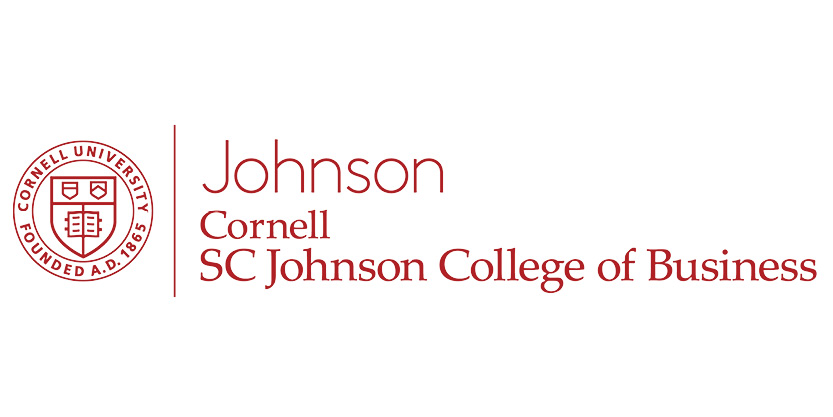Both one-year and two-year MBAs offer plenty of benefits for those looking to kickstart a career—they provide you with an intensive business foundation, the opportunity to network, and the chance to try for an internship. But what are the real differences between them?
At Cornell University’s Samuel Curtis Johnson Graduate School of Management, both the One-Year and Two-Year MBA programs naturally offer a range of benefits, but are also designed to appeal to different students.
To help you decide which program is right for you, BusinessBecause has investigated the ins and outs of each program, so you’ll know you’re picking an MBA that’s right for you.
Cornell MBA Class Profiles
MBA Curriculum
The main difference between the programs is, somewhat obviously, their length. However, choosing between a one-year and two-year program can also have repercussions for the types of courses you can follow, and how flexible you can make your MBA.
Students on the Two-Year MBA at Cornell will spend their first year working on the program’s core courses, as well as integrated field work (to prepare for a summer internship), and leadership skills workshops.
The One-Year MBA follows the same curriculum, though core courses are completed in a streamlined 10-week summer session and over the fall semester—it really is like a more intensive version of the two-year course.
One-Year MBA students also have the chance to complete a ‘Management Practicum’ program, specially designed for the shorter program, that allows students to work on real-life consulting projects for companies. After the winter break, students can elect a customized immersion program, something students on the two-year MBA must wait until their second year to do.
Of course, hands-on learning isn’t amiss from the two-year MBA—students will have the lucrative chance to score a summer internship in the gap between their first and second years of study, perfect for getting to grips with a new career path.
It’s this summer internship that can be the deciding factor in choosing a new industry, making the two-year MBA a great option for students who as yet aren’t sure about committing to a sector, or find they don’t currently have the skills for a new career path.
READ MORE: Why MBA: Johnson At Cornell University
Class profiles
A huge difference between Cornell’s One-Year and Two-Year MBAs is the class size. If you’re looking for a personal, intimate program, the Two-Year perhaps isn’t for you—you’ll be sharing a class with around 280 others (though this is nothing compared to Harvard’s 938.)
The One-Year MBA, by comparison, peaks at around 70 depending on the year—this means more facetime with your professors and teachers.
The classes are intentionally designed to be this size. The one-year MBA students also take their first term core modules with the one-year Johnson Cornell Tech MBA cohort at the start of the program, doubling the class size for a short period. The size of the two-year MBA is also designed for intentionally high collaboration across leadership and immersion experiences. The class sizes mean that faculty know students by name rather than number.
In the fall, the two-year MBA program's second year students are joined by the one-year MBA cohort as they choose electives for their program goals.
Cornell’s One-Year MBA is ahead of the Two-Year program in terms of international exposure, with 57% and 32% international students respectively—so it may be a good option if you’re also a student looking to mingle and network with an internationally diverse cohort.
For US students, the Two-Year MBA does offer the chance to connect with international students from more varied countries—30 are represented in the class of 2021, which, though unsurprising considering how many students are on the program, is a huge jump compared to 13 on the One-Year MBA.

Employment
It’s no secret that an MBA can boost your career options, but how do the one-year and two-year programs at Cornell differ?
Unsurprisingly, students on both programs can expect promising graduation prospects—90% of students on the one-year MBA in 2018 reported having a full-time job by the end of their graduation year, with 94% of two-year MBAs reporting the same three months after graduation.
It’s worth noting, though, that 74% of students reporting full-time employment on the two-year MBA received their offer through school-facilitated job activities, compared to 44% of one-year MBAs. This might be due to the reasons for doing the respective MBAs—with the investment students give to a two-year program, you can be sure that Cornell will invest in seeking out job opportunities for their students later.
Similarly, it could be that one-year MBAs already have an idea of where they want to end up. With Cornell’s One-Year MBA offering curriculum flexibility, you can streamline the degree to really fit your interests—which is exactly what students like Karthika Nair did.
READ MORE: When Should You Consider A One-Year MBA?
Which to choose?
With all that in mind, who do the One-Year and Two-Year MBA programs really appeal to—and which one is best for you?
If you’re thinking about time, Cornell’s One-Year MBA really packs a punch. The one-year accelerated MBA is positioned for candidates with an advanced education under their belt, whether in the form of a master's degree or certification, who want to push on in their existing industry, company, or area of expertise. Making a career change is definitely something that can be accomplished after graduating from the one-year program, but the ideal candidate is one who wants to build upon existing expertise.
The traditional, two-year MBA still stands as a classical ‘sure-fire’ way to secure yourself a career change afterwards. If you’re willing to put in the time—and money—for Cornell’s Two-Year Program, the benefits are there. 93% accepted job offers within three months of finishing the program, with their average base salary over $15,000 higher than those graduating from the One-Year MBA.
With the two-year MBA you also have the option of an internship, and experiential immersions and live team projects, which are cornerstones of the Cornell two-year MBA program. Many candidates that come into the two-year MBA want to make a career change while also advancing their skills.
As with any graduate business program, though, be sure to weigh up all your options before committing—how long do you want to be in education for? Do you want a broader view of the business world, or to focus on something more specific? Whichever you go for, Cornell’s top-rated MBA programs and 40,000 strong network will be sure to take you where you want to go.










